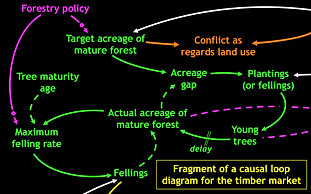Systems thinking
What do you get if you cut an elephant in half?
You don't get two half-elephants.
Rather, you've taken a system that worked quite well, and transformed it into two systems that don’t work well at all.
The techniques of analysis and disaggregation have been very powerful in helping us understand many systems - indeed the whole of science and engineering is based on this. Some systems, though, are not susceptible to this approach - the act of carving the system into ever smaller parts destroys the very subject of interest.
What, then, is the key characteristic of a system determines whether it can successfully be broken down into its component parts, or is destroyed? The answer is connectedness: if an integral part of the system is the connectedness of the component parts, then breaking the system into its component parts necessarily destroys the essence of the system.
That’s why analytic, scientific techniques have been relatively unsuccessful in helping us gain insights into the behaviour of human systems - communities, teams and organisations are very strongly connected.
So how can we tackle real systems? By using systems thinking, that's how.
Systems thinking is a rigorous method which can be very successfully used to map and understand the behaviour of complex systems. This
helps diagnose why the system might not be working as effectively as it might, and provides a powerful platform for designing a better system. Dennis is one of the UK's premier systems thinkers, and the author of the highly-regarded book Seeing the Forest for the Trees - A manager's guide to applying systems thinking, as well as many articles (for example, Don't KISS - SMOOCH ) and introductory guides, such as The Silver Bullet Guide to the Systems Perspective and Making causal loop diagrams easier to read.
And click on these bullet points for some examples of systems thinking as applied to
* Climate change, global warming and Gaia Theory
* When Zelenskyy met Trump - the events of 28 February 2025
* Trump's tariffs - the events of 2 April 2025
* How to manage a service business
* How teachers meet performance targets
* What might happen when doctors hold budgets
* The UK government's policy to deport asylum seekers to Rwanda
* The steady increase in the number of top grades awarded in exams
* 'Organodynamics' - how to get useful work from organisations
* The failure of many regulators to protect the weak and vulnerable
